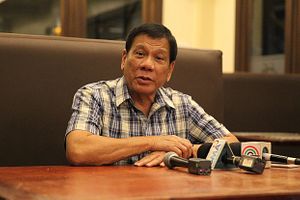Philippine President Rodrigo Duterte has ushered in the start of his third year in the presidency with yet another spike in violence – a dark feat given the previous two years have been defined by the war on drugs.
Five local officials have been killed since the start of the month, joining thousands dead in anti-drug operations since 2016. A smaller but significant death toll has also quietly climbed this year with clergymen gunned down in churches and on the street as opposition to his administration grows.
To be sure, such types of violence had existed in the Philippines even before Duterte came to office. But Duterte’s tough approach to tacking these longstanding issues, and the concerns generated with respect to democracy and human rights, have increased the scrutiny on these incidents as such spikes in violence occur.
That has continued on this month. For instance, Antonio Cando Halili, mayor of Tanauan in Batangas province just to the south of Manila, was shot dead Monday, July 2, during a public event. Halili was killed with a shot to the chest in a dramatic scene as the Philippine national anthem played as shown in cellphone footage which went viral on social media.
He had been one of the more vocal supporters of Duterte’s anti-drug campaign, but had told Reuters in 2016 it should target the “kingpins” rather than small-time offenders before the death toll gets out of hand. He also become well-known for parading drug offenders through the town as a novel form of punishment.
The next day Ferdinand Bote, mayor of General Tinio to the north of the capital, was shot by a lone gunman while in his car. Police have arrested a suspect in the case and say that motives are likely related to local political issues or family business ties. But, like Halili, Bote was an avid supporter of fighting drug crimes.
The next incident that made the headlines was on July 7, when two community leaders were gunned down on the same day. Michael Magallanes, who had been elected a local councilor of Zamboanga City in Mindanao during May elections, was gunned down while on his motorbike. Assailants and motive are still unknown. Magallanes was new to the role but had been a prominent rising star in local politics.
Later on Saturday, Trece Martires Vice Mayor Alexander Lubigan and his driver were both killed in a shooting while inside a vehicle. Lubigan was killed in the city, just to the south of Manila. The assailants’ alleged vehicle has been found, but no suspects or motives are at this stage known.
Most recently, Sapa-Sapa Vice Mayor Al-Rashid Mohammad Ali was killed Wednesday, July 11. Investigators say the vice mayor had been stopped by traffic in his car when an unknown assailant had attacked, firing four shots. Again, both suspects and motives are unknown.
This latest burst of violence is a smaller part of a much broader mural of violence. Three Catholic priests have been killed so far in 2018, with another’s residence attacked this week. National police chief Oscar Albayalde has said that the deaths are not part of a trend of clergy attacks and are isolated cases. Maybe, but with the police also implicated in alleged violence and cover ups elsewhere the body is not the most robust.
Questions are piling up faster than bodies. Under Duterte’s first two years, the country has become bloody, earning a global reputation not for the drug scourge – but for the lawlessness and impunity seemingly rife. While motives are still unclear or unconfirmed in many of these deaths, what is clear is that there are two major overall themes.
Firstly, politicians who are vocally supportive of the war on drugs and ending local drug rings are likely to have become the target of those rings. While links are unconfirmed, reporting tends to focus on the lengths politicians, particularly Halili and Bote, have gone to in fighting drug crime.
This complicates the war on drugs. The bloody, violent fight has always been unsustainable, with petty criminals far more likely to end up dead on the streets of barangay than big time traffickers. Elected officials have been targeted repeatedly during the Duterte administration, but so many deaths within a week indicates a frightening surge in violence which he must address. Local leaders run the risk of becoming martyrs for the cause – a dangerous reelection strategy.
On the other hand, the murder of clergymen is widely seen as retribution for opposition to the Duterte administration. Months of attacks on priests have been seen as “crossing a line that generations of Filipinos have respected even in revolutionary times,” Philippine Daily Inquirer columnist Randy David wrote last month.
This has come at a time when Duterte himself has ramped up attacks on the church with bizarre rants about the “stupidity” of God. This is a misstep in the Philippines where some 80 percent of the population identifies as Catholic. The religiosity this figure represents is certainly debatable, but it underscores the power the church carries.
Shortly after making these comments and with dead priests piling up, Duterte entered his third year of presidency with his worst polling figures yet. Polling firm Social Weather Stations (SWS) reported Duterte’s approval rating had plunged 11 points to just 45. This is still considered “good” by the pollster, but is far below the 70+ figures he had enjoyed early on.
This latest burst of violence occurred at a time when the Philippines has avoided international scrutiny by virtue of much larger stories across the region. But with no signs of violence slowing down paired with confusion of when his term will end, he will soon be back in the spotlight.
































